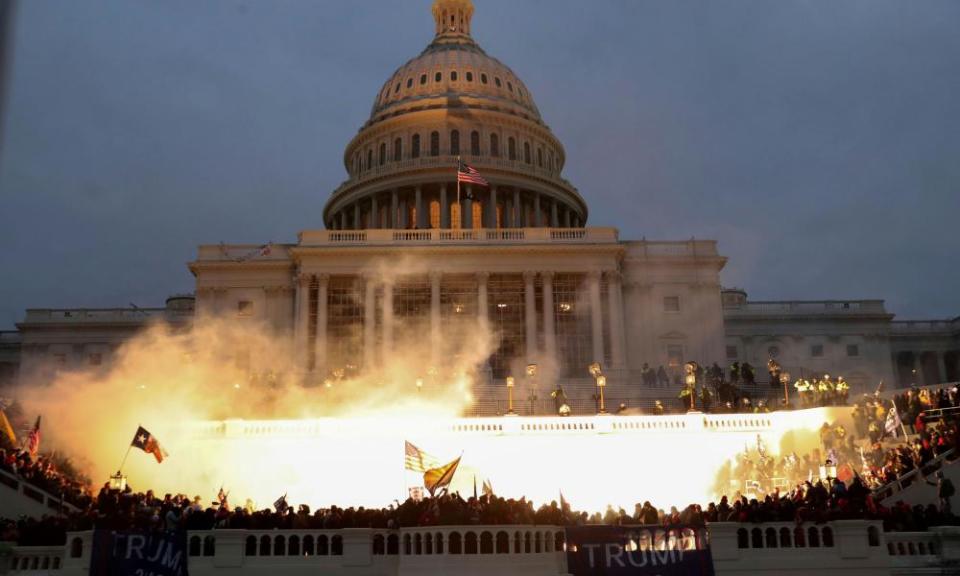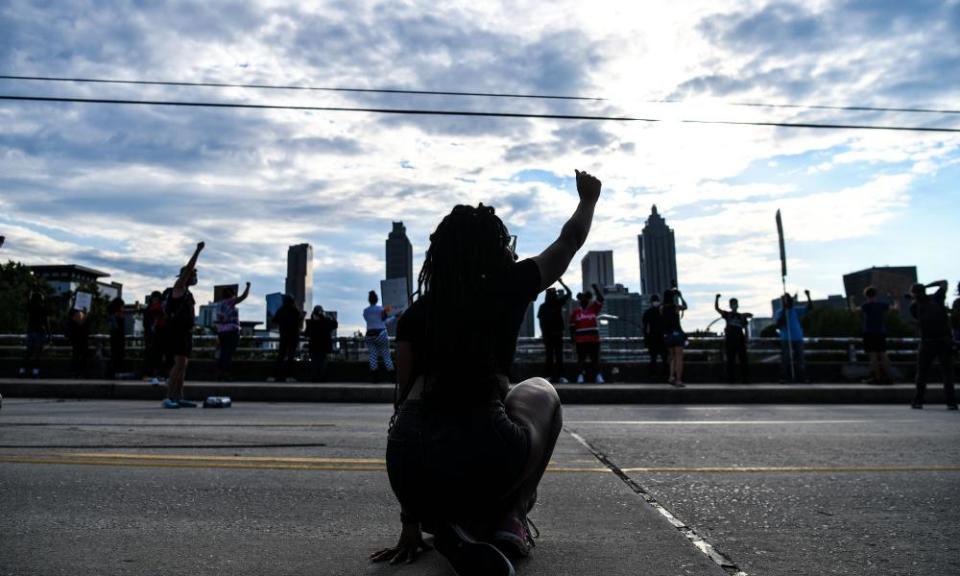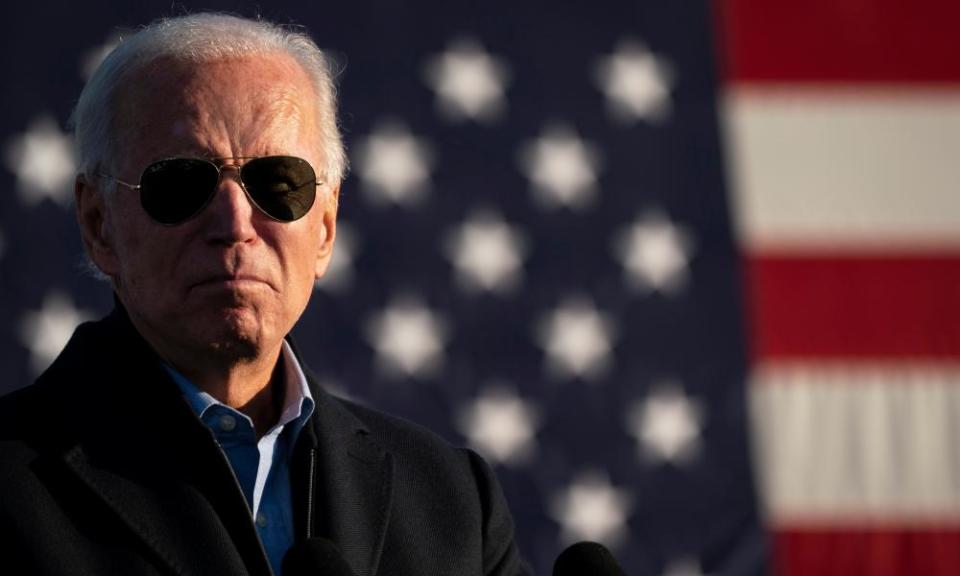Can Joe Biden make America great again?
Every year after 1975, Joe Biden, his second wife Jill, his sons Beau and Hunter and their growing families, would gather for Thanksgiving on Nantucket island off Cape Cod. Part of the annual ritual was that the Bidens would take a photograph of themselves in front of a quaint old house in the traditional New England style that stood above the dunes on their favourite beach.
In November 2014, when Biden was serving as Barack Obama’s vice-president, he found, where the house should have been, an empty space marked out by yellow police tape. The building, he wrote in his memoir Promise Me, Dad had “finally run out of safe ground and run out of time; it had been swept out into the Atlantic”.
This absence haunted him. On his return to Washington, Biden “kept seeing the little … house, undermined by the powerful indifference of nature and the inevitability of time, no longer able to hold its ground; I could almost hear the sharp crack as its moorings failed, could envisage the tide as it washed in and out, pulling at it relentlessly and remorselessly until it was adrift on the water, then swallowed up by the sea.”
If Biden were to write this now, it would read as a heavy-handed political metaphor. He is about to fulfil an ambition that has driven him for half a century by assuming the presidency of the United States.
But he arrives to find that great office a ruin, with police tape all around it. Donald Trump’s demented last days have washed away the illusion of the US as a stable, settled democracy. On 6 January, a date that will live long in American infamy, all the entitled rage of the white nativism that Trump has channelled finally burst through the seawalls that protected the illusion of a healthy, functioning republic. The polity escaped complete inundation, but the breach is gaping.

Yet Biden, in 2014, was not thinking of the collapsing house as an image of American politics. It troubled him, rather, as a token of the fragility of human existence. Has there been, at least since Abraham Lincoln, an American president so melancholy? One so inclined to view the world through the lens, not just of history, but of eternity?
The impulse comes with the territory of Biden’s Irish Catholicism, its fatalistic view of this earthly existence as, in the words of the rosary, a “valley of tears”. This is, as Biden sees it, “the Irishness of life”.
This rueful stoicism is, however, primarily shaped by intimate experience: the road crash that killed his first wife, Neilia, and their daughter, Naomi, in December 1972, shortly after Biden was elected to the Senate at the age of 29; Beau’s death from cancer in 2015. When he was a young senator, the journalistic in-joke was to refer to him as “Joe Biden (D-Del, TBPT)”. Those last four letters stood for “touched by personal tragedy”, a label that clung to him like a clammy mist of perpetual mourning.
The odd thing is that this tragic vision just might be what his country needs right now. Perhaps the way that the old house acts as both a political metaphor and a personal memory points to a confluence of the man and the moment. Perhaps the dark shadow of TBPT that walks beside the triumphantly ascendant Potus is not so much a ghost and more a guardian angel.
The culture wars that have racked America, and the flags waved during the assault on the Capitol that said “Jesus is My Savior, Trump is My President”, make it too easy to see the Republicans as religious zealots and the Democrats as rational secularists. Too easy, therefore, to miss the most obvious thing about Biden: his religious sense of mission.
In his speech accepting the Democratic party’s nomination for the presidency he evoked “a battle for the soul of this nation”. He conjured Trump as a malign demiurge who has “cloaked America in darkness”, plunged the country into “this season of darkness”, and written “this chapter of American darkness”. He promised to be “an ally of the light, not of the darkness”.
In normal times, this rhetoric would seem ludicrously over the top, all the more so coming from a garrulous, glad-handing old Irish pol, who spent 36 years in the Senate and eight as vice-president. Biden is not obvious casting for the role of apocalyptic warrior.
In fact, however, as 6 January made all too clear, Biden’s oratory is understated. The darkness of Trump’s presidency has not been a season or a chapter. Biden’s own presidency cannot, therefore, be an American spring that naturally succeeds the Trumpian winter, or a happy resolution to a grim but temporary twist in America’s narrative of democratic progress.
The darkness, as Trump’s antics and the violence of his most loyal supporters have demonstrated, is not going to go away at the flick of a switch. Biden’s great strength may be that, because of what life has done to him, he knows his way around in the dark.
There are, in effect, two Bidens: the politician and the person. The second is more interesting than the first. The paradox is that the more personal his presidency is, the more politically potent it can become.

Trump abolished the distinction between the private and public selves of the presidency, embodying the principle of personal rule, government by whim, instinct, gut feelings and above all by self-interest. The logic would seem to be that Biden has been elected to do the opposite. But it is a logic he has to resist.
There are, of course, many basic ways in which Biden must indeed restore the idea of a government of laws, not of men. The rule of law itself has to be re-established after Trump’s flagrant delinquency, corruption and treachery. The commitment to competence and expertise, so wilfully trashed by Trump, has to be renewed. The tools of democratic deliberation – truthfulness and evidence-based rationality – have to be refashioned.
As the mob took control of the Capitol, Biden called for “the restoration of democracy, of decency, of honour, of respect, the rule of law. Just plain, simple decency.” No doubt in that moment, these words resonated with the majority of Americans.
The danger though, is that this idea of restoration slips too easily into Biden’s instinct, forged over five decades of deal-making, for doing business as usual. It dismisses Trump as a wild, one-off deviation, a freakish fever after which the body politic can return to its natural, healthy condition of consensual bargaining.
What makes this temptation so attractive is sheer relief. After the relentless torrent of toxicity that has poured out from Trump, even the sound of silence would be a joy. Biden offers the chance to exhale. But the pleasure, however deep, will be brief. Consensus is not on offer.
Biden the Irish pol is a revenant from a dead era. His skills as an operator, a fixer, a problem-solver, are finely honed – but they are redundant. He is a horse whisperer who has to deal with mad dogs. He is a nifty tango dancer with no possible partners. There is no reasonable, civilised Republican opposition with which he can compromise. There can be no such thing as a unilateral declaration of amity and concord.
There has been an open attempt to turn the US into an authoritarian regime – what has happened once can happen again
If he did not know this already, the Republicans’ support for the nullification of the November election, maintained by its leaders in the House of Representatives even after the storming of their citadel, has surely brought it home to him. The most basic rule of the old order – the acceptance of the result of an election – can no longer be taken for granted. There has been an open attempt to turn the US into an authoritarian regime in which elections exist merely to endorse the eternal strongman. What has happened once can happen again.
And this is not just about Trump. Nearly 75 million people voted for him knowing (because he repeatedly told them so) that he would never accept defeat. Almost the entire Republican party in Congress either explicitly supported his attempt to subvert democracy or sat silent for months while it unfolded. For Biden to pretend that he can restore a pre-Trump normality would be disastrous. Trump and the Republican base he still owns will simply exploit conciliation to make Biden look weak and foolish.
In that sense, the political Biden is not the man who can change America. It is that other, richer persona, the private self, shadowed by time and loss and a sense of tragedy, that must come into its own. His supporters understood this in November – they voted for him in unprecedented numbers, less because of what he said he would do and more because of who he is: a man of sorrow acquainted with grief.
Biden’s tragic self now rises to meet two American tragedies, one very immediate, one long and slow. The immediate one is the malign mishandling of the pandemic. Trump, at his inauguration four years ago, spoke of “American carnage”. He did not say that he would cause it. The most powerful country in the world, with vast scientific and logistical capacities, has allowed close to 400,000 of its people to die from Covid-19, very many of them because of lies and misgovernment.
Trump did not feel this pain, either personally or electorally. Biden does feel it. His own sorrows have made him deeply attuned to the meaning of death, but also profoundly resilient in the face of its depredations. If the purpose of tragedy in art is to allow us to look death in the eye and not be defeated by it, Biden’s life experience has uniquely fitted him to fulfil that purpose in public life. He can allow Americans to grieve, while also restoring their faith in science, reason and good government.
If he does this successfully, he will also have the authority to address the other, historical American tragedy: the irony of great republican ideals built on foundations of cruelty, oppression and structural inequality. He will have a moment in which he can confront the other truths that are self-evident: that gross racial, social and economic inequity has always disfigured the US. If the tumult of the last two years has made anything clear, it is that the denial of this truth cannot persist.

In this, his familiarity with the dark can be Biden’s great strength. In his own life, he has been there and come back. He knows that it cannot be denied, but that it can be transcended. He can invite America to encounter its own darknesses – the legacy of slavery, the persistence of official and unofficial white supremacist violence, the failure to provide the access to education and healthcare necessary for the equal dignity of citizens – while reassuring its people that after such acknowledgement can come real change for the better.
The great problem of American political discourse has always been – strangely for such a Biblical culture – a refusal to accept the idea of original sin. Tragic narratives are driven by some version of this idea: something went wrong at the beginning and, until it is confronted and expiated, it will continue to play itself out in havoc and pain.
Biden has to create a bold departure from the hollow promises of the American dream and towards a new, real equality
The mainstream American narrative has worked in the opposite direction. The foundational acts are sacred. If the present has gone wrong, it is because we have deviated from our origins. We must return to those foundations and we will be great again. Trump repeated exactly this story; Biden must break from it once and for all.
The current conservative image of the American polity is as a solid house unfortunately invaded by a boor, who took possession of it for four years and wrecked the joint. It is time to call in the restorers: Joe Biden & Co.

The truth is closer to that vanished house in Nantucket that so haunted Biden. The Trump years represented the crumbling of a building “no longer able to hold its ground”. His increasingly deluded and destructive ramblings are “the sharp crack as its moorings failed”. The ramparts of law and order that were supposed to protect it failed and it has been flooded by a high tide of proto-fascism.
You don’t try to rebuild on land that has been washed away. You move elsewhere. In his own mad, intuitive way, Trump has already done this for his followers. He no longer even pretends to occupy the terrain of democracy. He has built his own new piece of real estate in which the US is a demagogic despotism, wholly owned by himself and his family. Even after the deadly debacle of 6 January, a huge part of the American polity is content to up sticks and follow him there.
Biden has to create an equal and opposite space, with an equally bold departure, away from the hollow promises of the American dream and towards a new awakening of real equality. He has, after all, little to lose, not just in the political sense of having no second term to win, but in the personal one of having already endured so much loss. He has the paradoxical freedom of knowing that nothing that lies ahead of him is likely to be as bad as what lies behind him. In that freedom lies the possibility of a courage adequate to the fight he has promised to engage in – a relentless struggle for America’s soul.


